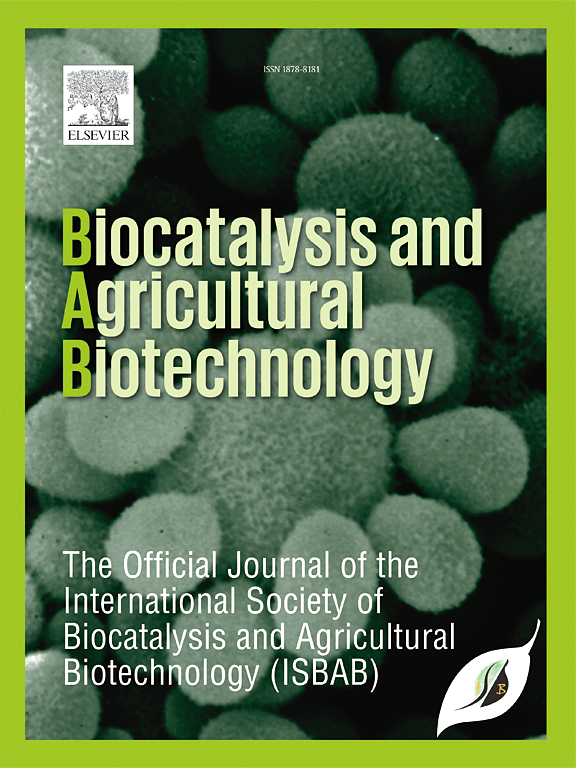Diesel oil degradation and biosurfactant potential of novel indigenous bacterial strain Onchobactrum intermedium
IF 3.4
Q2 BIOTECHNOLOGY & APPLIED MICROBIOLOGY
引用次数: 0
Abstract
The extensive worldwide usage of Petroleum Hydrocarbons (PHs) for energy leads to the petroleum spills posing significant hazards to environmental health. The remediation procedure for these pollutants is often extensive, laborious, and relies heavily on chemical treatments, which contradict the principles of sustainable development. Hence, the development of green technology-based solutions for remediation drives is imperative.
This study highlights the significance of utilizing Onchobactrum intermedium as an eco-friendly and cost-effective resource for environmental remediation, offering a sustainable and efficient approach to mitigating petroleum spill-related hazards. Interestingly, this bacterium was isolated from diesel oil-contaminated soil in the Haldwani & Lalkuan region of Uttarakhand, India, and identified on the basis of 16S rRNA sequence analysis, embarking this study as a first report of the bacterium claiming as a diesel oil degrading agent.
Through gravimetric analysis, the study found that Onchobactrum intermedium breaks down 55.17% of diesel oil in 35 days at 30 °C. Remarkably, the treatment reduced the half-life of diesel from 76.5 days to 27.5 days compared to the control. GC-MS examination of the residual diesel showed degradation of organic components between C9 and C27, with C21 exhibiting substantial degradation competence.
Moreover, Onchobactrum intermedium was recognized as a potential fabricator of biosurfactants, with lipopeptides biosurfactant production documented at 2.85 g/L. These biosurfactants can improve the emulsification of diesel oil, making Onchobactrum intermedium more operative for diesel oil degradation. This study not only advances our understanding of microbial bioremediation but also provides a practical solution that aligns with sustainable development goals.
柴油降解及生物表面活性剂潜力的研究
世界范围内石油烃作为能源的广泛使用导致石油泄漏,对环境健康造成重大危害。这些污染物的补救程序往往是广泛的、费力的,并且严重依赖化学处理,这与可持续发展的原则相矛盾。因此,开发基于绿色技术的修复驱动解决方案势在必行。本研究强调了利用盘状杆菌中间体作为一种生态友好且经济有效的环境修复资源的重要性,为减轻石油泄漏相关危害提供了一种可持续和有效的方法。有趣的是,这种细菌是从哈尔德瓦尼(Haldwani)被柴油污染的土壤中分离出来的。该细菌来自印度北阿坎德邦(Uttarakhand)的Lalkuan地区,并基于16S rRNA序列分析进行了鉴定,这是首次报道声称是柴油降解剂的细菌。通过重量分析,研究发现,在30℃条件下,Onchobactrum中间体在35天内分解了55.17%的柴油。值得注意的是,与对照组相比,处理将柴油的半衰期从76.5天减少到27.5天。残留柴油GC-MS检测显示C9和C27之间的有机成分降解,其中C21表现出较强的降解能力。此外,Onchobactrum intermedium被认为是生物表面活性剂的潜在制造者,其脂肽类生物表面活性剂的产量为2.85 g/L。这些生物表面活性剂可以改善柴油的乳化作用,使中间onchobacterum对柴油的降解更有效。这项研究不仅提高了我们对微生物生物修复的理解,而且提供了一个符合可持续发展目标的实用解决方案。
本文章由计算机程序翻译,如有差异,请以英文原文为准。
求助全文
约1分钟内获得全文
求助全文
来源期刊

Biocatalysis and agricultural biotechnology
Agricultural and Biological Sciences-Agronomy and Crop Science
CiteScore
7.70
自引率
2.50%
发文量
308
审稿时长
48 days
期刊介绍:
Biocatalysis and Agricultural Biotechnology is the official journal of the International Society of Biocatalysis and Agricultural Biotechnology (ISBAB). The journal publishes high quality articles especially in the science and technology of biocatalysis, bioprocesses, agricultural biotechnology, biomedical biotechnology, and, if appropriate, from other related areas of biotechnology. The journal will publish peer-reviewed basic and applied research papers, authoritative reviews, and feature articles. The scope of the journal encompasses the research, industrial, and commercial aspects of biotechnology, including the areas of: biocatalysis; bioprocesses; food and agriculture; genetic engineering; molecular biology; healthcare and pharmaceuticals; biofuels; genomics; nanotechnology; environment and biodiversity; and bioremediation.
 求助内容:
求助内容: 应助结果提醒方式:
应助结果提醒方式:


